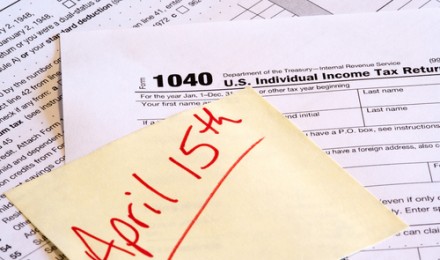You can get a tax refund on your income tax if you owe less income tax than what was withheld from your income, as well as what was the estimated tax that you paid from the withholding taxes. Additionally, you can determine any refundable tax credits which might alter the amount of money you withheld from your paycheck. A refundable tax credit is a tax credit that is treated as a payment of taxes, and thus overpaying on these “credits” can then be refunded by the IRS and processed into your tax return. Such refundable tax credits might include things such as an adoption tax credit (for the years 2010 and 2011), the homebuyer credit, the health coverage credit, or the earned income credit to name a few.
A tax refund is money that you get back if you overpaid your income taxes. While many people look upon tax refunds as a good thing and see them as interest free savings, the fact is that when you get a tax refund it just means you have given the IRS an interest free loan. Still, many people do receive tax refunds and there are a few things to consider to determine if you should get a refund.
How to Know if You Should Get a Tax Refund
You will receive a tax refund any time your employer withholds too much money from your paycheck. The amount of money withheld depends upon how many dependents and how many exemptions you claim when you fill out your W-4 tax form when you first get hired. By decreasing the amount of exemptions you claim, more money will be withheld from your check, so you should get a tax refund if you claimed too few exemptions. As such, if you get a tax refund this year, you should consider increasing the amount of exemptions that you claim on your W-4 tax form.
If you made charitable donations this year, then you should also get a tax refund because charitable donations are tax deductible. By increasing your charitable donations, you also increase the amount of tax deductions that you can claim on your income tax statement. This can thus increase your refund. However, you must be careful to abide by the tax code rules—you must make the donation to a nonprofit that can prove its tax status, you must keep the receipt for such a donation, and not the entire donation is deductible on your filed taxes.
Each year, you should further review your filing status. If you are married, you might want to consider filing a joint tax return because your refund will frequently increase. However, this is not true for all married couples. Some exceptions include if one spouse has significant medical expenses, or if one spouse has more unpaid student loans than the other spouse. If you divorce or if your husband or wife died, you should also change your status and you will likely receive a larger refund.
You can further claim a deduction if you are working for a company that requires you to purchase some equipment on your own, and does not reimburse you. A common example of this is a subscription to a professional journal that helps you continue to abide by your professional duties. Another example is the fees to belong to a professional organization. This can also allow you to get a refund.
Because there are so many factors that go into whether you will receive a tax refund or not, the best way to know if you will get a refund is to use a calculator such as the TurboTax Taxcaster. The calculator allows you to input your income and information and calculates your refund (or the amount you owe). The calculator is free.
You can get a tax refund on your income tax if you owe less income tax than what was withheld from your income, as well as what was the estimated tax that you paid from the withholding taxes. Additionally, you can determine any refundable tax credits which might alter the amount of money you withheld from your paycheck. A refundable tax credit is a tax credit that is treated as a payment of taxes, and thus overpaying on these “credits” can then be refunded by the IRS and processed into your tax return. Such refundable tax credits might include things such as an adoption tax credit (for the years 2010 and 2011), the homebuyer credit, the health coverage credit, or the earned income credit to name a few.
A tax refund is money that you get back if you overpaid your income taxes. While many people look upon tax refunds as a good thing and see them as interest free savings, the fact is that when you get a tax refund it just means you have given the IRS an interest free loan. Still, many people do receive tax refunds and there are a few things to consider to determine if you should get a refund.
How to Know if You Should Get a Tax Refund
You will receive a tax refund any time your employer withholds too much money from your paycheck. The amount of money withheld depends upon how many dependents and how many exemptions you claim when you fill out your W-4 tax form when you first get hired. By decreasing the amount of exemptions you claim, more money will be withheld from your check, so you should get a tax refund if you claimed too few exemptions. As such, if you get a tax refund this year, you should consider increasing the amount of exemptions that you claim on your W-4 tax form.
If you made charitable donations this year, then you should also get a tax refund because charitable donations are tax deductible. By increasing your charitable donations, you also increase the amount of tax deductions that you can claim on your income tax statement. This can thus increase your refund. However, you must be careful to abide by the tax code rules—you must make the donation to a nonprofit that can prove its tax status, you must keep the receipt for such a donation, and not the entire donation is deductible on your filed taxes.
Each year, you should further review your filing status. If you are married, you might want to consider filing a joint tax return because your refund will frequently increase. However, this is not true for all married couples. Some exceptions include if one spouse has significant medical expenses, or if one spouse has more unpaid student loans than the other spouse. If you divorce or if your husband or wife died, you should also change your status and you will likely receive a larger refund.
You can further claim a deduction if you are working for a company that requires you to purchase some equipment on your own, and does not reimburse you. A common example of this is a subscription to a professional journal that helps you continue to abide by your professional duties. Another example is the fees to belong to a professional organization. This can also allow you to get a refund.
Because there are so many factors that go into whether you will receive a tax refund or not, the best way to know if you will get a refund is to use a calculator such as the TurboTax Taxcaster. The calculator allows you to input your income and information and calculates your refund (or the amount you owe). The calculator is free.







